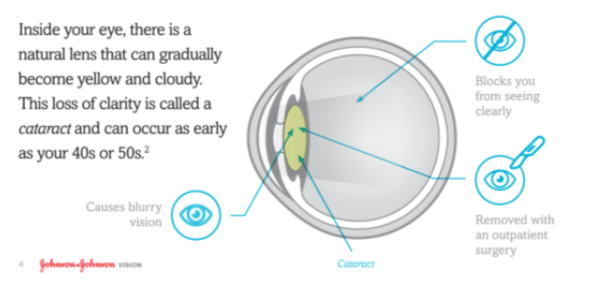Click Here to Download Additional Facts on Cataracts
Cataract FAQs:
What is a cataract?
A cataract is a clouding of the eye’s natural lens, commonly caused by protein build up overtime. In the front of our eyes, we are born with a lens - the eye’s natural lens. This lens sits just behind the iris, the colored part of the eye. The job of the eye’s natural lens is to focus light on the back of the eye so we can see clearly. This job of the lens is similar to a lens on a film projector that focuses light on a screen. Our lens focuses light on our retina, and that’s how we see.When we are born, the eye’s natural lens is crystal clear. Over time, the lens gets cloudy. This is usually a slow process that occurs day by day over many years. This clouding results from many reasons including aging, medical illnesses such as diabetes, smoking and alcohol consumption, exposure to ultraviolet light, eye injuries and trauma, and the use of certain prescription medicines such as prednisone.
What is cataract surgery?
There is no medicine or eye drop that can clear up the clouded lens in the eye. The only treatment to cataracts is to remove them. The procedure of removing the eye’s clouded lens is cataract surgery. Today, in modern cataract surgery, the eye's clouded lens is removed and replaced with a crystal-clear, artificial lens implant.
What is “custom” or “premium” cataract surgery?
Up until several years ago, patients did not have a choice on the type of lens implant that was placed in their eye or the method used to remove it. A Monofocal lens, or single-distance lens, with a bladed procedure was the only available option. Now, most patients can choose the type of lens implant and astigmatism correction method based upon their desired outcome after surgery.
What are my choices for lens implants?
With modern cataract surgery, not only can we make your vision better than it was before you developed cataracts, but it may be possible to make your vision better than it has ever been. We do this by the use of premium lens implants and astigmatism correction methods.
These premium options include:
A Multifocal lens provides 20/20 distance, intermediate, and near vision. The Multifocal lens we use has a 99.2% patient satisfaction rate.
A Toric lens is designed to reduce or eliminate moderate to severe corneal astigmatism.
A Limbal Relaxing Incision, or LRI, is a minimally invasive procedure in which tiny incision(s) are made at the corneal periphery (edge of the cornea, also called the “limbus”) in order to treat mild corneal astigmatism.
Monovision is an option for patients that allows one eye to see good at distance and one eye to see good at near vision.
Cataract surgery can also be performed with the precision of femtosecond laser, the LenSx laser.
You may choose to have a Monofocal implant placed in your eye after cataract surgery. However, with this basic lens, you will have to wear glasses for your best vision.
Is cataract surgery covered by my insurance?
Yes. Cataract surgery is a covered expense under Medicare and ALL private medical insurances exactly like most other surgeries, for example, heart surgery or knee surgery. As with any procedure, you may have a co-payment or deductible.
Are the premium lenses and methods that reduce or eliminate the need for glasses covered by my insurance?
Unfortunately, insurance does not cover the extra cost associated with the use of premium lens implants, astigmatism correction methods, or the LenSx laser. This is similar to some hearing aids and dental implants that are not covered by insurance. These out-of-pocket expenses may seem expensive at first. But when you consider how much you use your eyes each day and the potential savings on glasses or contacts, the investment pays off many times over. The exact costs will be discussed with you by our patient counselor at the time of your visit.
We offer 24 month, no interest APR financing through Wells Fargo. You can apply at www.WellsFargoHealthAdvantage.com/apply
What does the procedure involve?
Cataract surgery is performed in an operating room at the Surgecenter of Louisville on Dupont Circle. It is a totally outpatient procedure. The procedure itself takes only about 10 minutes! Plan on spending 2 or 3 hours at the surgery center for preparation and recovery. You will need a responsible adult who can drive you home after the surgery and consent to staying with you for 6 hours following the procedure.
Patients are awake for cataract surgery. We use a medicine through an I.V. for deep relaxation. We then use a series of drops to numb the eye. Dr. Cassol will make tiny incisions in the side of your eye that you will not feel. Through those incisions, he will use a microscopic ultrasound to break up the cataract into little pieces and remove them, a process called phacomemulsification. He then puts implants the artificial lens that you have chosen. Because of the cutting-edge technology combined with the deep relaxation anesthesia, most patients only remember being taken into the operating room and then being told the procedure is complete!
Is cataract surgery safe?
Cataract surgery is a very safe and successful surgery. In the United States, the procedure has over a 97% national success rate. That means about 97% of people see BETTER after than they did before the surgery. No surgery, however, is 100%. Your surgeon will discuss with you in detail your specific risks for cataract surgery.
What is the recovery time for cataract surgery?
Very short! Most healing takes place during the first several days. While it may take a month or so to fully visually recover and stabilize from the procedure, most patients notice a significant improvement the next day and can even drive themselves to their follow-up appointments. Patients can resume normal adult activity the next day, or 24 hours later. This includes returning to work, showering, washing your face, wearing make up, running errands, watching TV, golfing, and walking. However, patients should not swim or get in a hot tub for one week.
When can I return to work?
More often than not, patients can go back to work the very next day. Depending on your profession, however, you made need to take more time off of work. Your surgeon will discuss with you your specific timeline for returning to work.
Schedule a Consultation
Call 502-938-3937
Cassol Eye
704 Breckenridge Ln.
Louisville, KY 40207



